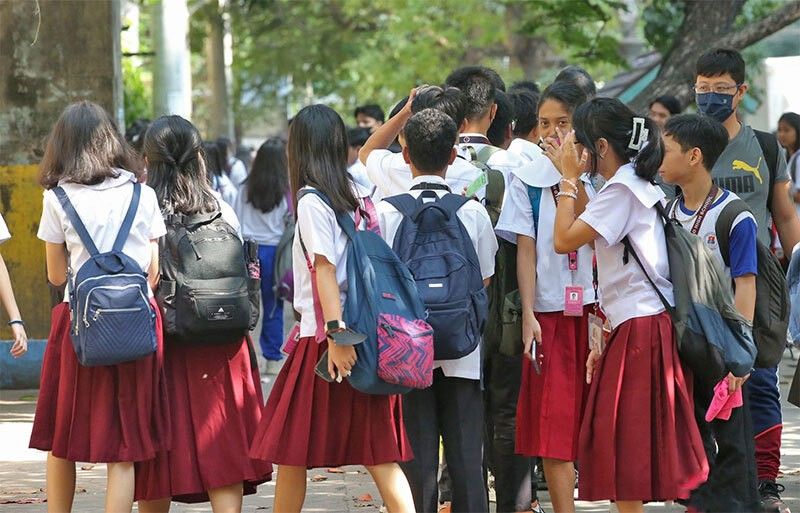‘Senior high students to congest public schools’

MANILA, Philippines — Transferring displaced senior high school (SHS) students from state colleges and universities (SUCs) to public schools would congest classrooms nationwide amid the Department of Education (DepEd)’s “outstanding classroom backlog of about 165,000,” groups of teachers and students warned yesterday.
In a joint statement, Teacher’s Dignity Coalition (TDC) and Samahan ng Progresibong Kabataan (SPARK) suggested that the DepEd consider the geographic distribution of students who could be displaced by the looming discontinuation of SHS in SUCs and local universities and colleges (LUCs).
“We assert that with the DepEd’s outstanding classroom backlog of about 165,000, accommodating displaced SHS students will be the main concern. It will mean that classes in public schools will be congested, which will lead to overburdening our teachers,” the groups said.
“The DepEd should consider the geographic spread of the displaced students so as to prevent enrolling them in schools miles away from their residences, which will bear additional costs to their families,” they added.
The DepEd’s data show that about 160 SUCs and LUCs offered SHS programs before the Commission on Higher Education’s directive for all SUCs and LUCs to stop offering SHS programs starting school year (SY) 2024-2025.
SUCs and LUCs offered SHS programs as part of an agreement with the DepEd for the transition period for K-12 from 2016 to 2021, when most colleges and universities would have little to no freshmen.
The admission of SHS students was ordered to stop due to the lapse of transition period and the expiration of legal mandate of SUCs and LUCs to offer SHS programs.
TDC and SPARK also scored the DepEd’s “default response” to the long-standing congestion problem by encouraging students to transfer to private schools and avail themselves of vouchers to subsidize their schooling.
They added that the DepEd needs to look into diploma mills and fly-by-night schools that “charge exorbitant school fees, which include pricey field trips, uniforms and superfluous expenses that fail to contribute to the holistic development of our learners.”
“While this is true, given the ample increase in the budget of the GASTPE in the (country’s) national budget for 2024, the DepEd must first rid itself of diploma mills and fly-by-night schools that have contributed to the declining quality of education in the country and have served as a milking cow for unscrupulous individuals,” the groups said, referring to the Government Assistance To Students And Teachers In Private Education Act.
“The prevalence of these schools is a challenge endured not only by students and their parents, but also by our teachers and the general taxpaying public. We call on the DepEd to release the audit of the schools that have accessed the GASTPE program and their evaluation of these questionable schools. Our hardworking taxpayers deserve better if we truly aspire for a well informed and intelligent society,” they added.
Meanwhile, the Alliance of Concerned Teachers (ACT) called on DepEd to reconsider the implementation of the revised Grade 1 to 10 curriculum dubbed “Matatag” and instead consult education stakeholders for “a relevant and responsive curriculum.”
“The DepEd has not even significantly resolved shortages in classroom, teachers, and teaching and learning materials, but opted to push through with its ‘curricular reforms.’ We reiterate that K-12 is a big failure and no amount of revision will fix it,” ACT chairman Vladimer Quetua said.
The ACT made the statement following the DepEd’s announcement of the mass training of teachers for the full implementation of the Matatag curriculum this year.
“Any endeavor to improve education quality and address the learning crisis will prove futile and counterproductive if the curriculum is not attuned to the learners’ needs, if teachers’ welfare and crucial involvement in the curricular changes are overlooked, and if basic educational needs are not adequately met,” Quetua said.
Benchmarked on the “decongestion” of learning competencies, such as reducing subjects in the early grade levels to focus on foundational skills such as oracy and numeracy, the Matatag curriculum intends to improve students’ learning outcomes and help them succeed.
After the pilot tests this school year, the new curriculum will be implemented in phases: first in preschool and Grades 1, 4 and 7 in all public and private schools starting SY 2024-2025; Grades 2, 5 and 8 in SY 2025-2026; Grades 3, 7 and 8 in SY 2026-2027 and Grade 10 in SY 2027-2028.
- Latest
- Trending






























